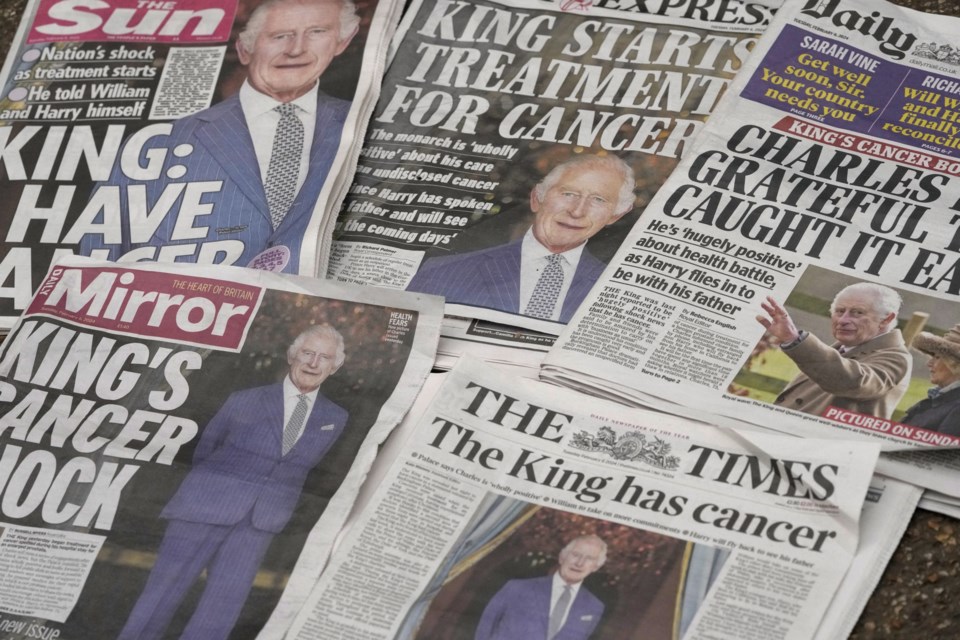TORONTO — Buckingham Palace's announcement that King Charles has been diagnosed with "a form of cancer" is a significant boost for public awareness about the importance of early detection, cancer organizations in Canada say.
The palace's statement said "swift intervention" by his medical team came after the cancer was discovered during a procedure to treat a benign prostate enlargement. The cancer they found was not prostate cancer, officials said, but they did not specify further.
The King chose to go public with his diagnosis "in the hope it may assist public understanding for all those around the world who are affected by cancer," the statement said.
That decision is "incredibly helpful," said Stuart Edmonds, executive vice-president of mission, research and advocacy for the Canadian Cancer Society.
"He's talking about early detection and the fact that if cancer is caught early enough ... they can actually treat and he has options," Edmonds said.
The fact that the King did not specify what type of cancer he has doesn't make the message any less valuable, he said.
"We have a lot of really, really, amazing treatments that are available for many different cancers," Edmonds said.
"Lives can be saved and lives can certainly be prolonged more and more if we detect early."
Thedirector of the Princess Margaret Cancer Centre at University Health Network in Toronto, agreed, noting that screening programs are in place in Canada for colon, breast, prostate and cervical cancers. In some parts of the country, there are also lung cancer screening for people at high risk due to smoking, said Dr. Keith Stewart.
The King's disclosure is "very useful" for promoting discussion about cancer screening and to "take away some of the stigma in a cancer diagnosis," he said.
"In many countries (it) is still something people don't like to talk about," he said.
King Charles' public announcement could also be helpful in addressing a "big gendered element" when it comes to preventative health care, said Todd Minerson, director of the Canadian branch of Movember.
"(Men) typically don't take as much agency or control over our own health," Minerson said.
"We are less likely to seek help, or ask for help. And we're less likely to follow up when we do get recommendations that are beneficial for our health."
The King's cancer revelation helps to reinforce Movember's goal to help men be more proactive about their physical and mental health, and that includes screening for cancer, he said.
"These kinds of conversations that we can have now when a public figure discloses their cancer journey are the ones that we should also be having in our family," Minerson said.
"(It's) a plug for men to really take agency over their health, to have those difficult conversations, to have them with your family, to have them with your kids," he said.
Doing so shows other boys and men in their lives that "it's OK to ask questions, OK to be vulnerable. And, you know, it's OK to be active in your own health care," Minerson said.
In addition to screening, early detection of cancer also depends on people paying attention to their bodies and going to see their primary care provider when something "doesn't feel quite right," Edmonds from the cancer society said.
Although there are different symptoms for different types of cancer, there are a few things that should trigger health-care professionals to investigate further, Stewart from the Princess Margaret Cancer Centre said.
"In general, as physicians, we worry about unexplained weight loss, unexplained increase in fatigue, as well as many physical symptoms like a nodule or a lump (that) appears," Stewart said.
Most of the time cancer won't turn out to be the cause, but it's important to get those symptoms checked, he said.
Unlike the King, many Canadians don't have access to a family doctor, both Edmonds and Stewart acknowledged.
That inequity needs to be addressed, but in the meantime, people with those symptoms should go to a walk-in clinic, they said.
This report by The Canadian Press was first published Feb. 7, 2024.
Canadian Press health coverage receives support through a partnership with the Canadian Medical Association. CP is solely responsible for this content.
Nicole Ireland, The Canadian Press

